In the early days of World War II, the Japanese army invaded Burma (now Myanmar) and forced an end to British colonial rule there. Occupying Burma required troops and massive amounts of materiel, though, and the Japanese navy was taking a beating on the 2,000 mile sea route around the Malay Peninsula. And so it was decided that a railway connecting Thailand and Burma would be constructed through dense tropical jungle over hilly terrain with hundreds of rivers, including the Kwae Noi River, made famous by the Hollywood treatment of the story in The Bridge on the River Kwai. The real story of what came to be known as the Burma Death Railway is far grislier than any movie could make it, and the ways that the prisoners who built it managed to stay alive is a fascinating case study in making do with what you’ve got and finding solutions that save lives.
Nutrition from Next-to Nothing
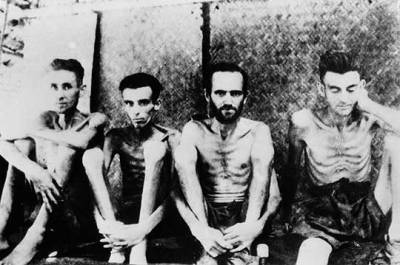
With the POWs was Doctor Henri Hekking, who had been born and raised in the former Dutch East Indies colony of Java (now Indonesia). He had spent his early years with his grandmother, a master herbalist who served as “doctor” for the native villagers. Inspired by his oma’s skill and convinced that the cure for any endemic disease can be found in the plants in the area, Dr. Hekking returned to Java as an officer in the Dutch army after completing medical school in the Netherlands.
After his capture by the Japanese, Dr. Hekking did everything he could to help his fellow POWs despite the complete lack of medical supplies, all the while suffering from the same miserable treatment. Hekking realized early on that the starvation rations the POWs endured were the main cause of disease in the camps; a cup of boiled white rice doesn’t provide much energy for men building a railway by hand in jungle heat, and provides none of the B vitamins needed by the body.
Weakened by nutritional diseases such as beriberi and pellagra, the POWs either wasted away or became susceptible to dysentery or any of a host of tropical infections. He solved these problems with a little jungle ingenuity. To bolster the protein-poor diet, he cooked blood from a water buffalo slaughtered for the Japanese mess into the POW’s rice. To round out the diet, he recovered B vitamin-rich rice husks from an abandoned jungle village’s grindstones and made cakes that the prisoners ate. Neither were terribly palatable, but the improved nutrition made a difference.
Hacking Solutions, Not Limbs
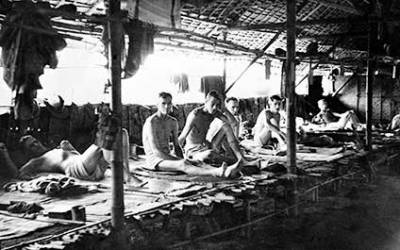
Early on in his internment, Doc Hekking was drawn to the Americans in the camp. He thought they were crazy – laughing and joking in the face of untold misery, and willing to do whatever it took to survive, even when it meant eating his foul but nutritious concoctions. Most of the American sailors and marines in camp were farm boys who had come of age in the Depression, and were used to hardship and making do. Such skills were particularly useful in cobbling together the equipment Doc Hekking needed to help the men. When major wounds needed sutures, James “Packrat” McCone fashioned the needle from a scrounged safety pin. He hammered a flat spot and used a pocket knife to ream a hole for some twine. Boiled for a few minutes, it did the trick. When a badly ulcerated leg needed a special surgical tool to remove infected bone, a POW in another camp fashioned scrap metal into the chisel-like instrument that Doc needed to save the patient’s leg.
When Life Hands You Bamboo, Make Everything
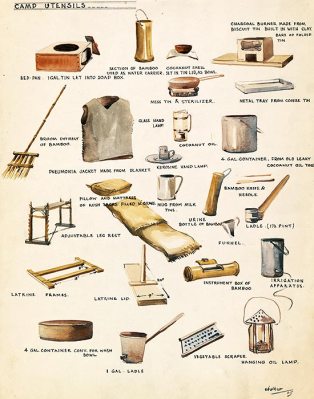
Doc Hekking’s Legacy
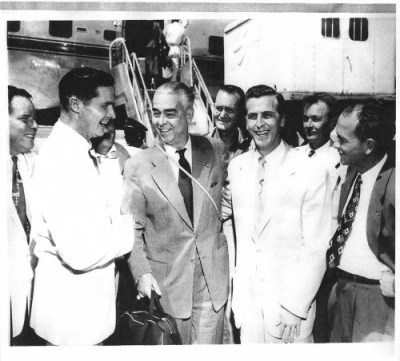
But what of Doc Hekking’s results? Did his men fare better under his unconventional treatments and hacked solutions? It seems so. While the overall POW death rate was 20%, Doc managed to keep his losses to 7% of the 194 men in his camp. And importantly, Doc performed not a single amputation.
Doc Hekking proves that sometimes, you can accomplish a lot with nothing at all, and that knowing things is often better than having stuff.

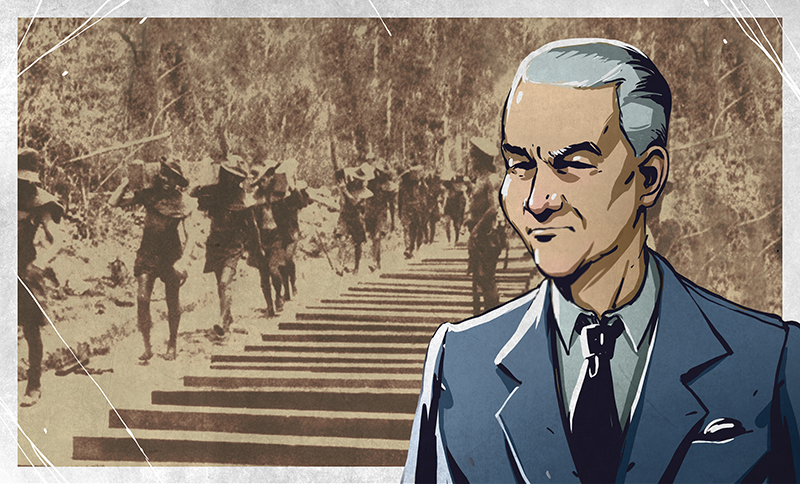














While the hacking is impressive it is nice to see at least a little of the history of WWII in Asia. Just like in Europe a lot of the politics of Asia are rooted in WWII. The Chinese for instance are shocked, disappointed, and or insulted by the how few people in the west know about the rape of Nanking.
The (present day) Japanese are pretty shocked, disappointed (and/or insulted?) when *they* find out about it too — Japan has this really bad habit of keeping all the bad things it did out of their history books.
I was in Japan around the anniversary of the bombing of Hiroshima and Nagasaki and for many that was the only notable incident from the war.
Most knew little else other than, there was a war and then they nuked us. Almost as though the bombing spoiled all the fun!
Plus you have things like the various death marches, Unit 731 (Which makes Dr. Mengele’s experiments look downright humane in comparison), Comfort Women, Cannibalization of allied POWs, indiscriminate warfare, deceptive diplomacy, the list goes on…
The fact that these things keep getting swept under the rug is a major factor to why we still have two Koreas rather than one (Kim IL-Sung and the Chinese rebels were supporters of the west before and during WWII, but the fact that we refused to prosecute the Emperor, and helped cover up many of the Japanese War Crimes destroyed all goodwill we had with them, pushing them into the arms of the Soviet Union)
I often wonder how history would have turned out if we prosecuted the Japanese Government like we did the Nazi Party…
I’m glad that you mentioned Unit 731(https://en.wikipedia.org/wiki/Unit_731). The war criminal at the head of it was never persecuted by the US, despite POW killings, including Americans (https://en.wikipedia.org/wiki/Shir%C5%8D_Ishii#War_crime_immunity).
If you have the stomach for it, “Merry Christmas, Mr. Lawrence” addresses some of the POW atrocoties. Arguably David Bowie’s best work in film.
People in the West (general population) know very little about WW2. They seem to think that the whole war consisted of landings in Normandy. Soviets holding the front pretty much alone for years (and suffering great majority of military losses) is simply not mentioned. Death of millions of civilians is often -in the West – reduced to talking about the Jewish dead only (6 million, vs. probably 30-40 million of other, non-Jewish, dead civilians).
Nonsense. We were taught all of these things, including what happened in Eastern Europe and Asia, when I was in school in the 80’s. Not only were we taught these things, but most of the kids I grew up with, myself included, had grandparents that fought in WWII who also taught us much.
Please don’t accept what the popular American media (especially not Hollywood) shows as having anything to do with what the average American knows, does, or thinks. Most of us are a lot smarter and better educated than what the media portrays.
For what it’s worth, I get the impression that the US actually educates their youth on modern history relatively well. Here in the Netherlands it seems all historians ever want to talk about is ancient Greece and Rome. For me at least, when it came to WW2 it was mostly a “LOOK AT HOW AWFUL THIS WAS, THIS MUST NEVER HAPPEN AGAIN”-scareshow with endless rehashing of the horrors of death camps and stories of how the people here turned on each other under the Nazi occupation (e.g. “Hey, Herr Nazi, I happen to know my neighbour is hiding a jew in the back room, can I have his silverware after you ransack the place?”). I will admit my primary education was particularly half-baked (less than stellar schools combined with me not giving a crap) but still.
One thing I do quite clearly remember is “over 50 million deaths”, the illusion of there being as little as 6 million was never given. I would guess there are no jews left here to point out “their” 6 million.
FYI, my AP US History course taught absolutely zero World War II.
AP – “Advanced Placement.” This kind of thing is supposed to be the most advanced history course you can take before college, and we only learned up to the 1910s. Didn’t even go over WWI, for that matter. The whole thing is a fucking joke. It’s a huge racket for the CollegeBoard.
Not going to refute the challenge to the College Board, but the inclusion of that information is dependent on the scope of the course. Perhaps the course was specifically designed as 19th century history?
I was certainly taught all this stuff at school (UK), I’m glad the American Media bears little to do with real Americans.
Lets hope so any way… The whole world seems hell bent on delivering dumb conformists in to the market place!
I believe you, partly. Here is why. A true story: A Phd I know (American) constantly gets confused between Slovakia and Yugoslavia. I wont even attempt to start him with Slovenia and Slavonia :)
So one person with a bad head for geography represents all 300 million of us? That is such a ridiculous insinuation that I can’t imagine how any intelligent human being could believe it.
Funny, I know where all of those countries are, and I haven’t taken a geography class in over 25 years. I guess that means I’m not American?
Here is a hint: not all of those is/are countries :) One is a region within a country (similar like Midwest in US for example). I’m not berating all Americans for not knowing geography – wa have plenty of uninformed people too. I’m just saying that media in the West should portray more balanced picture of WW2, and educate masses better.
It depends on how old you are and how the borders and names have moved about. Check “Germany” and that entire extended region before WWI versus after. Then again before and after the breakup of the Soviet Union.
To be fair, I don’t think ignorance of geography is a strictly American problem.
http://www.buzzfeed.com/robinedds/its-thanksgiving-so-we-asked-some-brits-to-label-the-us-stat#.mnlxMQ0Jl
http://www.buzzfeed.com/robinedds/happy-thanksgiving-we-are-very-sorry#.ia70B9Pgv
@DainBramage – There are few people that know geography. If you lived in the south you would be exposed to the level of knowledge displayed.
“Go back where you came from!” Was heard shouted by a gud ‘ole boy just this last week toward some other guy from Eastern Europe.
My first thought was “Where you here before the MayFlower showed up?” Check out the US map on the 7 sins. Envy make folks over spend and show boat. Pride makes the willfully ignorant.
As an American I can tell you that we were taught a lot about the war in Europe including the fact that Russia and Germany attacked Poland together and help train a lot of German pilots and only started to fight Hitler after Hitler attacked them. Before that Russia was an ally of Nazi Germany. We also know about the battles of Stalingrad, Leningrad, and even how the USSR stopped short of Warsaw to let the Germans destroy the uprising so that the USSR could install their own government after they took Warsaw. https://en.wikipedia.org/wiki/Lack_of_outside_support_during_the_Warsaw_Uprising
We were also taught about the failure of the League of Nations in stopping Italy in Ethiopia. We were also taught all about the war in the Pacific but the war in China, Korea, and Burma really seemed to be overlooked.
I too learned a lot of history, both at school in the UK, and later as a result of my own interest. However historical perspective is always coloured by your own interest, the curriculum offered, and even your geographical location.
A highly educated doctor friend of mine, who comes from India, observed that Hitler wasn’t too bad, because he assisted the Indians in overthrowing British colonial rule. This is of course historically incorrect, however it is also a not uncommonly held belief in the subcontinent. See here for an explanation of why that particular myth may have grown… https://en.wikipedia.org/wiki/Subhas_Chandra_Bose
There is some truth in the old adage that “History is written by the victors.” What is perhaps more important, is that politicians and those in power (and indeed the rest of us) learn from history, and unfortunately this is rarely the case. The article above does a good job on that score however, keep them coming and keep the standards high.
An awesome, enlightening article and you take it as a cue to talk down to the entire “West”. Nicely done.
I’d say Brits of a certain age are quite informed about the scope of things, I can’t speak for the rest of europe but in the UK there’s the Burma star association, Joanna Lumley of AbFab fame also champions the cause of the Gurkah’s who fought on behalf of the allied forces in that theatre in fairly high profile public events, and the chinese were indeed allies. Theres a interesting title from the “world at war” series that was shown on british public tv, and that deals explicitly with the burma conflict.
http://www.imdb.com/title/tt1130691/
For the original story, limbs were also amputated in the camps if they were found to have a tattoo by the guards presumeably because of their yakuza connections in japanese culture. And the treatment metered out was so deliberately bad because again culturally troops that surrendered were considered the ultimate cowards and so were despised.
I heard more stuff growing up as my dad indeed had the land version burma star from his service along with a shedload of tattoo’s that the whole regiment had rushed out and done in defiance when they were briefed the above. Photos of parachute jumps, company group shots, gliders crash landed in jungles etc.
I don’t mean any ill will to any particular nation outlining the above, its just facts and its important to remember bad things were done by people in power and ordinary people of whatever nation were forced into things that they never wanted to be involved in. And we should be mature enough to be able to discuss things like this openly accepting this.
But please Miroslav, next time you are discussing this with someone and they state the above, feel free to correct them that perhaps that is just a stereotype in itself that requires challenging.
>Soviets holding the front pretty much alone for years
You mean when they signed a pact with Hitler and TOGETHER invaded Europe from both sides?? or when they occupied it for 40 years?
I know that Poles dislike Soviets, with some reason. But please tell me, who would liberate Poland if it wasn’t for the Soviets? French and Brits sure attacked Hitler fast enough in September of 1939 to help Poland. Soviets killed several hundred thousand Poles (POWs and “class enemies”). But Hitler would kill ALL Poles if given enough time. So Soviets were much preffered to Nazis (and no, there was no 3rd option). If Poles waited for the West allies, nobody would be left – considering it took them to 1944. to land in the France with Soviet help.
All these other comments and none of them mentioned (so I will) WWII in North Africa, the destruction of the Italian 10th and Rommel’s Afrika Corps. Of course the prof I had for the history of WWII served in North Africa so maybe I got a little more of it than some of the others.
I was given a rather thorough education in WWII (in the UK). With an emphasis on Russia’s role.
Please, HaD is for the hacks of that situation ( that were very nice to hear about ) . The history/politics part is better left to the History Channel. Or shall we discuss also the chinese invasion of Tibet ?
You’re probably better off contacting HAD directly.
Sad to say the History Channel is too busy talking about aliens and pawn shops.
Agreed, I’ve been hoping for them to re-run “Mud Men” here in the UK – people digging up artefacts from the banks of the Thames in London – but they do seem to prefer the faux-reality American Pickers and things like that.
One post bender walk of shame I headed down to the bank of the Thames along the “millenium walk” from the Greenwich to the O2’s North Greenwich tube station.
Most of it was on the banks and the place was littered with people!
They called themselves “larkers” and would spend hours walking around until they found something and then walk to the nearest pub and discuss/trade/sell it!
https://en.wikipedia.org/wiki/Mudlark
Great fun.
Also the banks are LITTERED with bones, there are animal bones (apparently) from a saughterhouse upstream.
Context is important.
“Doctor reduces mortality, manages not to amputate Limbs”
Vs
“Enslaved doctor halves mortality, saves limbs in labour death camp with ingenuity, resourcefulness and lots of bamboo”
In fairness, “mortality” is not mentioned. He reduced amputations. I suspect mortality went up if anything.
But what of Doc Hekking’s results? Did his men fare better under his unconventional treatments and hacked solutions? It seems so. While the overall POW death rate was 20%, Doc managed to keep his losses to 7% of the 194 men in his camp. And importantly, Doc performed not a single amputation.
“I suspect mortality went up if anything.” Indeed not. over all mortality went down, 7% versus 20% read the article more carefully, and bear in mind there are three options, operate and amputate (high mortality risk), operate and don’t amputate, lower risk (but still pretty high), or do nothing (much higher risk, probably near 100%).
I don’t think I really touched on the politics of WWII at all in the article, so I assume @Rogfanther was talking more about the politics in the comments.
Oh, yes, sorry if the comment was ill-written. The article is very interesting showing what human ingenuity can come up when needed ( something like that “The Martian” film ) .
My comment about the politics was that people start to derail from the initial point and change to comparisions and the like, or claim that their favorite part of a war is not getting much attention by other people…
Not exactly politics but I had a head-snap to the wording for sure. “Japanese army invaded Burma (now Myanmar) and forced an end to British colonial rule there.” sounds downright noble. They forced an end to any rule but Japanese rule and the British certainly didn’t control the highlands and the Hmong in the greater region though they had contact and officials assigned to contact.
Also the reference to prisoners as slaves is odd. Slave has a specific meaning and includes ownership. True, the word is used for forced labor as well, but those are two different things. Slaves are valuable and would not be thrown away like military prisoners and local captives. Perhaps “enslaved locals and military prisoners forced to work” would be good. This is the first time I have seen these events written about so casually and offhand. I’m guessing this is the global perspective of a millennial who sees this as nearly 100 years ago. Where as to those of us a bit older (57% of working engineers are over 55 according to the latest surveys) these were times our parents were lucky to survive. I can tell you some great stories about Merrill’s Marauders and flying the Hump from India to China – the Burma airlift or being nursed back to health by a village of Hmong while being hidden from the Japanese troops. All from my parents circle of friends. I can recommend “King Rat” by James Clavel, who was himself a prisoner. If you don’t know him, check his Wiki entry and you will. Also read The Children’s Story. It should be required in school.
But, to the hacking. Bamboo is so amazingly useful that I often wished it grew in great forests in the States. On the other hand, I have wondered if bamboo is so useful that it negates the need for other technologies and is a factor in cultures that basically stay the same for many thousands of years. Either way, I know we would see a lot more bamboo on HaD
I did not mean to flag this comment. The flag button is right where my thumb scrolls on the edge of the tablet. Guess I better not read comments with this tablet. Sorry!
What is the difference between being enslaved and being a slave?
That is a damn good question but also one that has no right answer. There IS a difference but open to endless debate. Fasting vs Starving? Sunburn vs Out in the Sun too long? Killing vs Murdering? Sociopath vs Psychopath?
Being a slave means being owned for life and with papers to prove it backed by the government with force. Being enslaved is being forced to work against your will “like a slave”. A typical example would be Romans at war. If they had 10,000 captive fighters and the 20,000 women and children camp followers, they might decimate the fighters (count them off and kill every 10th one – yes, that is what it really means) to get their cooperation, make them build (enslave them) some defensive earthworks, then kill them all as too expensive and too dangerous to keep around. The 20,000 women and children are sent to Rome and sold as valuable slaves.
A Millennial? Only about two generations off…
Normally I agree with your argument, but in this case the background story is not only interesting but also places it into context. Without the background, what’s left is “a POW prisoner made a needle from a safety pin”, which without the story about the hardship etc has a big “so what” factor.
Here is more background story: http://www.theindoproject.org/memoir/doc-hekking
Great article. Here is a good read about the Burma Railway. I read it in the 90’s. Just discovered they made a movie about it. http://amzn.com/0099582317
Well, it seems that people reading this site are a bit more knowledgeable about the WW2 history. To clarify my position, I will just say that here in Canada, all the talk about the WW2 seems to be: D-day and Holocaust (typically around Rememberance day). Anything in depth rarely filters down through the media. And WW1 is all about the Vimy ridge (first independent Canadian action in WW1 – before it was all united British). As first poster observed, this might be very hurtful to those nations that lost millions more than Brits and Americans. Chinese, Russians, Ukrainians come to mind, together with number of other east European nations. Regarding the article: very interesting read.
American perspective: folks are wildly ignorant of the actual details, but they typically know *something* about the pacific theater. They may or may not know the phrase “Rape of Nanking” but they do know that the Japanese were complete asshats to China and Korea, as well as mistreating captured US servicemen. It frequently filters even to the most lowbrow media because it’s a huge part of the “we’re the good guys, world police” narrative–that Imperial Japan *needed* to be defeated, and we stepped up to the plate.
People also tend to have a general idea of how brutal the eastern front was, even if the only battle they can name is Stalingrad, and even if they don’t put two and two together and realize that the Soviets basically won the war in Europe. That’s crucial setup for the USSR’s rise to superpowerdom and the start of the cold war, which brings us right back to the “we’re the good guys” narrative.
So basically Americans are just as us-centric as far as history knowledge as Canadians, it’s just that due to my country’s role in the post WW2 world “shit that matters to us” is a broader category.
I visited Hellfire pass earlier this year.
A hack that I was told about is that the POWs modified the design of the bamboo train bridges so that they would collapse when trains traversed them.
More WW2 prisoners hacking. https://www.google.com/search?q=pow+camp+metal+lathe&ie=utf-8&oe=utf-8
How about building a regenerative radio receiver in a POW camp?
https://histru.bournemouth.ac.uk/CHiDE/Oral_History_of_Defence_Electronics/r_g_wells.htm
Manufacturering capacitors, resistors and batteries from the things available to them and all the while suffering from brutal beatings and on a starvation diet – true hacking heroes.
Thanks, very inspiring read.
spell check mofo, and you wonder why we don’t take this shit seriously
“spell check mofo, and you wonder why we don’t take this shit seriously” MOFO? I think with the possible exception of yourself, everybody has taken “this shit” seriously.
Indeed
When in Thailand for 10 days in 1987, I took a day trip to Kanchataburi.
There I walked across the Bridge over the River Kwai and toured the museum of the prison camp.
Unforgetable!
Great article, but I don’t know of a single 20 year old that has ever heard of this, sad so many people are ignorant of their own history. It is good work mixing real knowledge with all this great nerdy stuff.
I am getting on a bit now.
I remember my father lifting me out of bed, and going across the road to the air-raid shelter while the sirens were wailing, the searchlights were sweeping across the night sky, and the ack-ack guns were pounding away in the park about half a mile away.
Later on, after university, I once lived in a boarding house in Stevenage while I helped to build “Blue Streak” – look it up.
One of the boarders who was there for a few months (while his house was being built in “New” Stevenage) was a man who was captured at Singapore (I think he was in the West Lancs Fusiliers – he was from Lancs, anyway).
He spent over 3 years on that railway, and ended up in poor health, and with diabetes (I guess he was one of the lucky ones). His stories were a bit of a revelation to a young man.
Norman was a master machinist in civilian life. The Japanese found out about this, and shipped him off to a weapons manufacturing plant in Japan. This seems like a poor decision by the Japanese, because he, and some others like him, found various subtle ways of sabotaging the manufacturing that were not very obvious.
To cap the story, the plant was in Nagasaki (the outskirts, luckily), and Norman was there when “Fat Boy” was dropped.
There is a lot more to this story about his escapades after the war, but they do not fit here.
I’m honored to be an indirect relative to Dr. Henri Hekking — his diligence and persistence under desperate, lethal conditions shows what can be done by a man with bravery, imagination, intelligence and ingenuity.